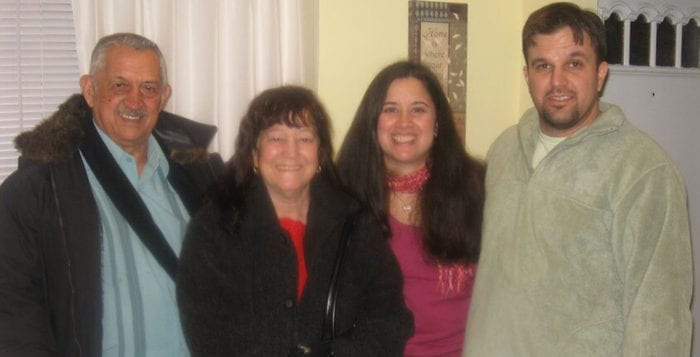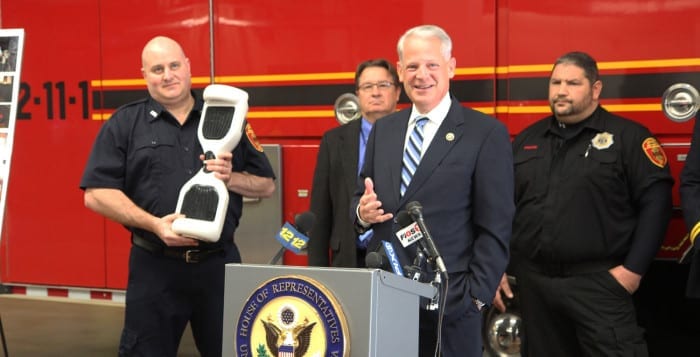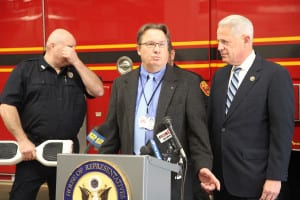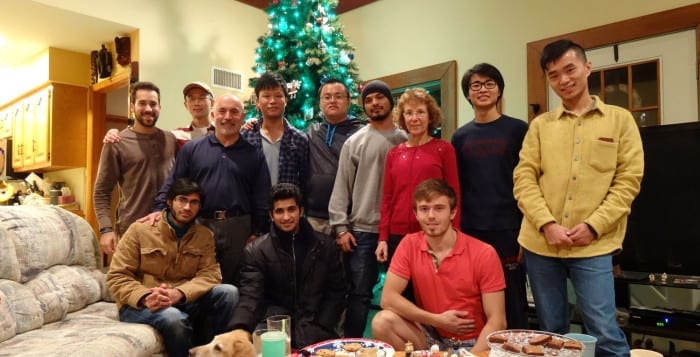By Desirée Keegan
Mikey Brannigan didn’t roam the halls of Northport High School, he ran down them. He’d dash through the doors as others raced behind him, saying “catch me if you can.”
“Stop that kid,” Brannigan said they would shout, laughing.
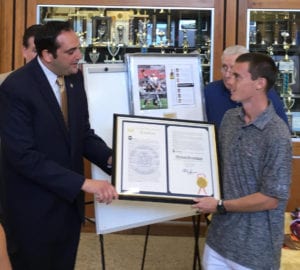
Brannigan battled his way to a successful high school career, and beyond after graduating in 2015. The runner is continuing to exceed expectations — being the only Paralympic athlete in history to hold simultaneous records in the 1,500-, one-mile, 3,000- and 5,000-meter events. He brought home two gold medals — in the 1,500 and 800 — and silver in the 5,000 at the London 2017 World Para Athletics Championships at the end of last month.
“Make no mistake about it Mikey wants to be the best,” his New York Athletic Club coach of two years, Sonja Robinson said. “His drive — it shines out. You see it. He loves running.”
Brannigan was diagnosed with autism at 3 years old, and began running at 8. Fast-forward 11 years, when as a 19-year-old he became the first individual with autism to win a gold medal in the 1,500. He also became the first athlete with a T-20 Paralympic classification to shatter the 4-minute mile threshold in August 2016 with a 3 minute, 57 second finish at the Sir Walter Miler meet in Raleigh, North Carolina. A month later, he competed in the Special Olympics in Rio de Janeiro, Brazil, where he took home the gold after a dominating 3:51 in the 1,5000.
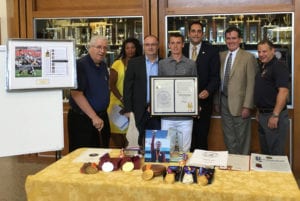
Now at 20, he’s training to compete in the 2020 Paralympics in Tokyo.
“I’m taking it little by little and want to show everyone that if you take even little steps you can achieve your dreams,” Brannigan said. “Look at all you can achieve. Work hard and you can achieve your dreams. You can achieve anything.”
Brannigan was honored by local government officials at Northport High School Aug. 9, receiving accolades for his accomplishments, while the members also dubbed Aug. 9 Mikey Brannigan Day in New York.
“He’s truly our hometown hero,” state assemblyman Chad Lupinacci (R-Huntington Station) said. “Mikey’s story is nothing short of amazing. What he has accomplished at his age is unheard of. His achievements are a true testament of his hard work, dedication, perseverance, sweat and tears.”
State Sen. John Flanagan (R-East Northport), whose kids graduated from and played sports in Northport, said he was in awe, and pointed to the back of the room — the local kids that were in attendance at the press conference — as the “cool” part of the event.
“He’s truly our hometown hero. Mikey’s story is nothing short of amazing. What he has accomplished at his age is unheard of.”
—Chad Lupinacci
“What we do when we go to Albany is we brag,” he said, putting his hands on Brannigan’s shoulders. “We tell everyone how cool our districts are, we tell everyone about the Northport school district, and we’re very proud of where we live and where we represent. There’s nothing, in my opinion, nothing better than dealing with young adults, no matter what they may be doing, because they’re the future.”
Brannigan grinned as he was invited to Albany in January to be recognized by the entire state legislature. State Sen. Carl Marcellino (R-Syosset) also presented him with a proclamation.
“We’re going to bring you up to Albany, but the bad news is, you have to run there and it’s 200 miles,” Flanagan joked.
“That’s a long, cold trip,” Brannigan responded, waiving his arms no.
Flanagan said he was humbled and proud to be in Brannigan’s presence.
“These are the stories people should know about and want to hear about,” he said. “I went from a stage where I used to run, then I jogged and now I walk. On my best day, I couldn’t even come close to the accomplishments of this young man, who really is a role model.”
State Assemblyman Andrew Raia (R-East Northport) agreed the barriers Brannigan has broken are unbelievable feats.

“Every day you turn on the television and something bad is happening,” he said. “I want to turn on the television to see this young man. It’s a big responsibility to carry, but in just the few moments I’ve had to talk with him, I know he’s up to the challenge.”
Raia proceeded to tell Brannigan he was going to embarrass him, to which he responded: “Do it.”
The assemblyman pointed out the runner’s red, white and blue Sperry top-siders, and said he needed to find out where he got them.
“He’s such a proud American,” Raia said, to which Brannigan smiled and shook his hand. “We wish nothing but the best. Keep running, my friend.”
Lupinacci shared a similar sentiment during the conference that was broadcasted on Facebook live and viewed by nearly 3,000 people.
“Your family and friends and all of us here today are proud of you,” he said as he gave Brannigan a hug. “Younger generations will follow in your footsteps. You’re not only our hometown hero, you’re an inspiration to all New Yorkers and all Americans. You’re an inspiration to people around the world.”


